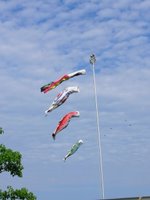来月、友達と台湾へ行きます。今年2回目のアジア旅行です。4日間の予定なので、台北のみですが旅行の計画を立てるのはとても楽しい。ガイドブックによると、標準言語が北京語で、日本語、英語がどれくらい通じるのか少々心配ですが、旅行社のパックツアーに頼らずにすべて自分達で観光地を回ることに決めました。地下鉄を利用して市内の見たいところはだいたい行けそうです。友達は、いろいろな種類の台湾料理を食べるつもりでいます。消化薬を飲まなくちゃ!皆さん、何かアドバイスがあれば是非お知らせ下さい。
I’m going to go to Taiwan with a friend next month. This is my second Asian trip this year. It’s so much fun making plans for this trip. We’re only going to stay in Taipei because we’re going there for four days. According to some guide books, they speak Peking and we’re a little worried about whether we can communicate with them in Japanese or English. But we decided to go sightseeing by ourselves and without any package tours from the travel agency. We’ll go to some of places that we want to see by subways. My friend really wants to eat many kinds of Taiwanese food. I have to take some medicine to helping me digest! Please give me some good advice or tips for this trip if you have any.
2006/09/28
2006/09/14
「と」「ば」「たら」「なら」 Particles
日本人が無意識に使い分けている「助詞」は、外国人にとってとても厄介なもののようです。「と」「ば」「たら」「なら」の使い分けについて質問をされました。これらの助詞には「もし」だけでなく、「~たとき」、「いつも」、「アドバイス」 など他にも意味があり、また重なっている意味もあります。色々な意見があるでしょうが、日本語教師暦の長い叔母の助言を受けて、私なりの簡単な使い分けを説明したいと思います。
「と」真実や絶対に決まっていることを表す
・ 夏は朝4時になると、明るくなる。
「ば」ことわざや慣用句などによく使われ、普段の会話ではあまり使わない
・ ちりも積もれば山となる。
「たら」一般的に、よく使われる
・ もし宝くじに当たったら、ベンツを買おう。
「なら」会話で、相手の言ったことに応える時に使う
・A:郵便局へ行きます。・
・B:郵便局へ行くなら、切手を買ってきて下さい。
Japanese people unconsciously use ‘particles’ in their sentences, but it's very difficult for foreigners to use them. I was asked how to use ‘to’, ‘ba’, ‘tara’ and ‘nara’. These particles have many different meanings, not only ‘if’ but also ‘when’, ‘always’, ‘advice’ and some other usages. And they also have the same meanings. My aunt who has taught Japanese for a long time helps me, so I’ll give you some easy explanations about these particles. I know there are a lot of opinions about this, but this is just my personal opinion.
‘to’ express the truth and when something is absolutely sure.
・In summer it becomes light at 4:00a.m.
‘ba’ used for proverbs and idioms. Rarely used for everyday conversation.
・A penny saved is a penny earned.
‘tara’ generally used for everyday conversation
・If I win the lottery, I’ll buy a Mercedes.
‘nara’ used in conversations when you are responding to someone.
・A : I’ll go to the post office.
・B : If you go to the post office, please buy some stamps for me.
「と」真実や絶対に決まっていることを表す
・ 夏は朝4時になると、明るくなる。
「ば」ことわざや慣用句などによく使われ、普段の会話ではあまり使わない
・ ちりも積もれば山となる。
「たら」一般的に、よく使われる
・ もし宝くじに当たったら、ベンツを買おう。
「なら」会話で、相手の言ったことに応える時に使う
・A:郵便局へ行きます。・
・B:郵便局へ行くなら、切手を買ってきて下さい。
Japanese people unconsciously use ‘particles’ in their sentences, but it's very difficult for foreigners to use them. I was asked how to use ‘to’, ‘ba’, ‘tara’ and ‘nara’. These particles have many different meanings, not only ‘if’ but also ‘when’, ‘always’, ‘advice’ and some other usages. And they also have the same meanings. My aunt who has taught Japanese for a long time helps me, so I’ll give you some easy explanations about these particles. I know there are a lot of opinions about this, but this is just my personal opinion.
‘to’ express the truth and when something is absolutely sure.
・In summer it becomes light at 4:00a.m.
‘ba’ used for proverbs and idioms. Rarely used for everyday conversation.
・A penny saved is a penny earned.
‘tara’ generally used for everyday conversation
・If I win the lottery, I’ll buy a Mercedes.
‘nara’ used in conversations when you are responding to someone.
・A : I’ll go to the post office.
・B : If you go to the post office, please buy some stamps for me.
2006/09/07
鮪のぼり Tuna fish flags
 日本では、5月5日の子供の日に子供の幸福を願い、家庭で武者人形や鎧兜を飾り、外に鯉のぼりを立てます。でも、葛西臨海公園の中にある葛西臨海水族園には、鮪のぼりが立っています。友達がこの写真を送ってくれました。始め、なぜそこでは、鮪の旗を立てているのかわかりませんでした。その水族園では、マグロが回遊している巨大な水槽があり、たくさんのマグロが群泳しているのをすぐそばで見ることが出来ます。だから、鯉ではなく、鮪のぼりが、空を泳いでいるんだと気づきました。おもしろいでしょう。
日本では、5月5日の子供の日に子供の幸福を願い、家庭で武者人形や鎧兜を飾り、外に鯉のぼりを立てます。でも、葛西臨海公園の中にある葛西臨海水族園には、鮪のぼりが立っています。友達がこの写真を送ってくれました。始め、なぜそこでは、鮪の旗を立てているのかわかりませんでした。その水族園では、マグロが回遊している巨大な水槽があり、たくさんのマグロが群泳しているのをすぐそばで見ることが出来ます。だから、鯉ではなく、鮪のぼりが、空を泳いでいるんだと気づきました。おもしろいでしょう。In Japan, the 5th of May is Children’s Day. On this day, we decorate our homes with samurai dolls or the armor, and also set up carp flags outside. We do this to pray for our children’s happiness. Kasai Seaside Aquarium which is in the Kasai Seaside Park has some tuna fish flags like the carp flags. My friend gave me this picture. At first, I didn't understand why they’d sat up tuna fish flags. The aquarium has many water tanks and a huge one filled with tunas. They swim around it and you can see them up close. Now I understand why they have the tuna flags waving in the sky. It’s interesting, isn’t it?
登録:
投稿 (Atom)